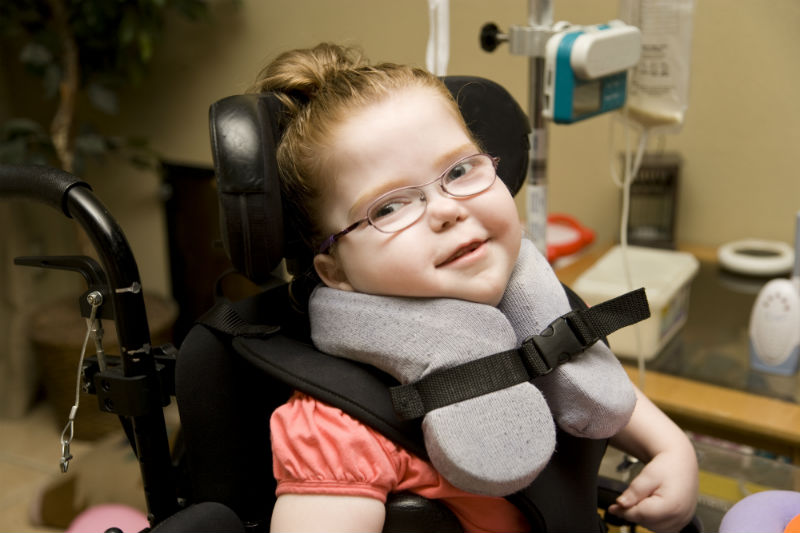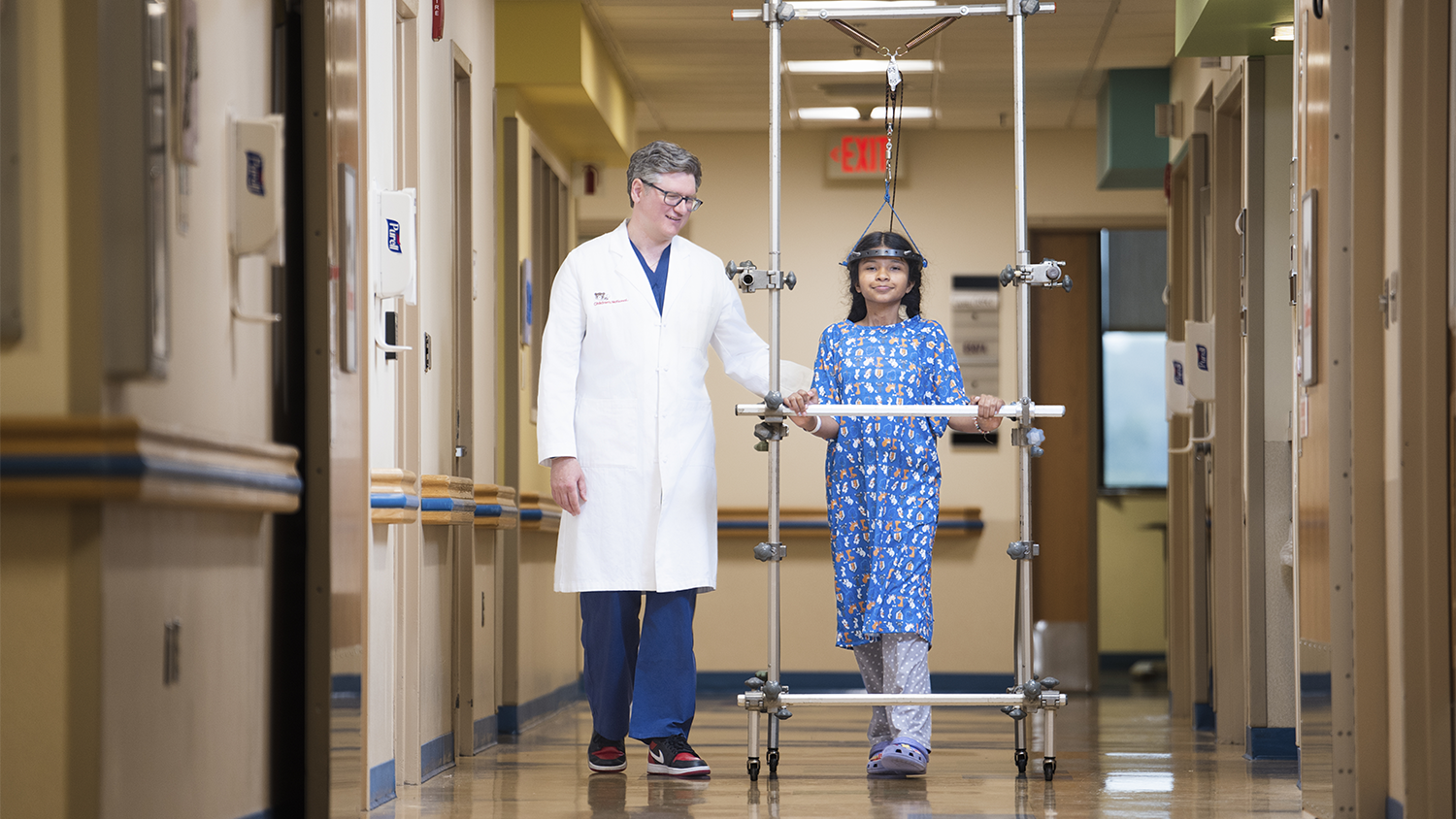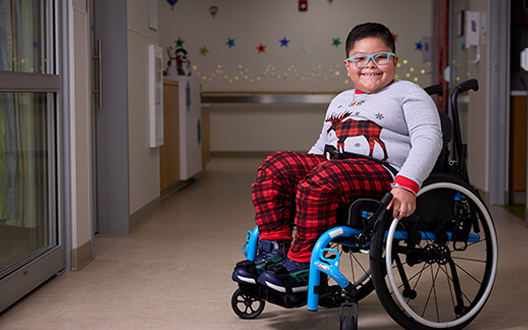Condition
Pediatric Spina Bifida
What You Need to Know
Spina bifida is a type of birth defect called a neural tube defect. It can cause part of the spinal cord and areas around it to form outside of the body.
Key Symptoms
The most common symptoms of spina bifida are:
- Area on the back that looks abnormal, such as a small hairy patch, dimple, birthmark or a pouch-like bulge (sac)
- No feeling below the place on the spine where the sac is
- Not able to move his or her legs (paralysis)
- Constipation or incontinence
Diagnosis
Doctors typically diagnose spina bifida by:
- Prenatal ultrasound
- Blood test
- Amniocentesis
Treatment
Treatment may include:
- Surgery
- Rehabilitation
- Positioning aids
- Braces and splints
- Medicines
Schedule an Appointment
Our pediatric specialists provide personalized care for your child’s physical, mental and emotional health needs. Meet our providers and schedule an appointment today.
Frequently Asked Questions
What is spina bifida?
Spina bifida is a condition present at birth (birth defect) when there are problems with the spine, spinal cord, and the surrounding nerves. It can cause part of the spinal cord and areas around it to form outside of the body. This problem can happen anywhere along the spine. Spina bifida is a type of neural tube defect. Neural tube defects affect 7 out of 10,000 live births in the U.S.
The types of spina bifida are:
- Spina bifida occulta. This is a mild form of spina bifida. The spinal cord and surrounding tissues stay inside the baby. But the lower spine doesn’t form as it should. The child may have a hairy patch, dimple or birthmark over the area of the defect. Or the problem may not have any visible marks.
- Meningocele. This is a moderate form of spina bifida. The fluid-filled sac that surrounds the spinal cord forms outside of the body in the spine area. The sac does not contain the spinal cord or nerves.
- Myelomeningocele. This is a severe form of spina bifida. Part of the spinal cord and nerves form outside the body. They are contained in a fluid-filled sac that bulges from the baby’s back. A baby with this problem usually has weakness and loss of feeling below the defect. The baby may have problems with bowel and bladder function. Most will also have a condition that causes the fluid inside the head to build up. This is called hydrocephalus. The extra fluid puts pressure on the inside of the head. The skull bones expand to a size that’s larger than normal.
What causes spina bifida in children?
During pregnancy, the brain and spine begin as a flat plate of cells. This plate rolls into a tube, called the neural tube. The tube is completely formed 28 to 32 days after conception. If all or part of the neural tube fails to close, this leaves an opening. The opening is called an open neural tube defect. The opening in the tube may be left exposed or covered with bone or skin. The neural tube in a child with spina bifida doesn’t close at some point along the spine. Spina bifida is the most common type of open neural tube defect.
Neural tube defects can be caused by genes passed on from both parents (inherited). They also can be caused by environmental factors like obesity or uncontrolled diabetes in the mother, and by some prescription medicines. In most cases, a child with a neural tube defect has no family history of this problem.
Which children are at risk for spina bifida?
Once a child with a neural tube defect has been born in the family, the chance that this problem will happen in another child rises to 1 in 25. The type of neural tube defect can differ the second time. For example, one baby could be born with anencephaly. But a second baby could have spina bifida instead.
Other risk factors for neural tube defects include:
- Mother’s age. Spina bifida is more common in teen mothers.
- History of miscarriage. A woman who has had miscarriages in the past has a higher risk of having a baby with neural tube defects.
- Birth order. First-born babies are at higher risk.
- Socioeconomic status. Children born into lower socioeconomic families are at higher risk for spina bifida. Researchers think that poor diet may be a factor.
What are the symptoms of spina bifida in children?
Symptoms can occur a bit differently in each child. They can include:
- Area on the back that looks abnormal, such as a small hairy patch, dimple, birthmark or a pouch-like bulge (sac)
- No feeling below the place on the spine where the sac is
- Not able to move his or her legs (paralysis)
- Constipation or incontinence
The baby may also have other problems such as:
- Increased fluid and pressure in the head area (hydrocephalus)
- Heart problems
- Bone problems
- Lower level of intelligence
The symptoms of spina bifida can be like other health conditions. Have your child see his or her healthcare provider for a diagnosis.
How is spina bifida in children diagnosed?
You may need tests while you are pregnant to check for spina bifida in your growing baby. The tests include:
- Blood test. A test called a quad screen measures 4 substances in the mother's blood to see if there is an increased risk for neural tube defects and other problems. This test is done between 16 and 18 weeks of pregnancy. It measures levels of alpha-fetoprotein (AFP) and other things in the blood. AFP is a protein made by the baby growing in the womb. If a baby has an open neural tube defect, the AFP level in the mother's blood will be higher than normal. The test isn’t conclusive, but it can show if your baby is at risk for an open neural tube defect. The test can show if you need more testing. The American College of Obstetricians and Gynecologists advises that this blood test be offered to all pregnant women.
- Prenatal ultrasound. This imaging test uses high-frequency sound waves and a computer to make images of blood vessels, tissues, and organs. Ultrasounds let healthcare providers see the internal organs as they function. They also show blood flow through blood vessels. Prenatal ultrasound may be able to find an open neural tube defect. Your provider may also use ultrasound to look at other organs and body systems of the baby.
- Amniocentesis. This test looks at a small sample of the fluid that surrounds the baby in the womb. The healthcare provider uses a long, thin needle to reach the amniotic sac. He or she takes the sample of fluid and checks it for AFP. The test may not be able to find small or closed defects.
After birth, the healthcare provider will give your child a physical exam.
How is spina bifida treated in children?
You may need to have a cesarean section to deliver your baby. This is often done to lower the risk for damage to the spinal cord that may occur during a vaginal delivery. Babies born with a meningocele or a myelomeningocele usually need to stay in the neonatal intensive care unit (NICU). The main goals of managing spina bifida are to prevent infection and to protect the spinal cord and nerves that are exposed outside of the body.
It often isn't fully known right after birth how serious the spina bifida is. It can become clearer as your child grows and develops.
Your child may need surgery (e.g., a Malone appendicostomy) to close the defect. Surgery can help manage the problems. But it can’t restore muscle function or feeling to normal. Your child may need surgery to:
- Fix and close the defect
- Treat hydrocephalus
- Treat bone (orthopedic) problems. Bone problems may include curvature in the back, hip dislocation, ankle and foot deformities, and contracted muscles. Babies and children with spina bifida are also at risk of breaking bones because their bones may be weaker than normal.
- Fix bowel and bladder problems. Surgery can help with going to the bathroom, incontinence and constipation or when the bladder does not empty fully.
After surgery, you will get instructions on caring for your baby at home. You may be told how to:
- Look at your baby’s skin, especially over bony areas such as the elbows, buttocks, back of the thighs, heel and foot areas. You may need to change your baby's position often to prevent pressure sores.
- Help your baby with bowel and bladder function
- Feed your baby and check your baby's nutrition
- Help your baby move and encourage him or her to be active
- Help with your baby’s growth and development
Not all babies need surgery to repair spina bifida. Instead a baby may need:
- Rehabilitation
- Positioning aids that help the child sit, lie or stand
- Braces and splints that help prevent deformity and give support or protection to areas of the body
- Medicines
Talk with your child’s healthcare providers about the risks, benefits and possible side effects of all treatments.
What are the possible complications of spina bifida in children?
Complications of spina bifida vary depending on the body system affected and how serious the problem is. Your child may have problems with muscle function, bones, and bowel and bladder emptying. Your child’s healthcare provider will discuss treatment options with you.
Babies with spina bifida are at high risk of developing a latex allergy. This is because they are exposed to latex during the many medical and surgical procedures they need. Your baby’s healthcare providers will do their best to limit how much latex your baby is exposed to. Your baby's healthcare providers can help you find out which products contain latex and also find products that are latex-free.
Renal Disease and Hypertension
Bladder control problems is common among children with Spina Bifida. This occurs because the brain is not able to receive signals to urinate through the spinal cord from nerves around the bladder. As a result, the bladder is not able to store or empty urine properly. This condition is called neurogenic bladder. A neurogenic bladder can result in frequent urinary tract infections, high bladder pressure, bladder-sphincter dysfunction or backflow of urine into the kidneys, swollen kidneys (hydronephrosis) or kidney scarring. These effects on the bladder can result in damage to the kidneys. High blood pressure can be a sign of kidney disease.
Children with spina bifida are at more risk for high blood pressure and kidney damage due to factors listed above. High blood pressure is diagnosed after three elevated readings at three different times. If the blood pressure of a child with spina bifida is in the high range for their age, an evaluation of the kidneys is needed. Referral to a pediatric cardiologist or nephrologist may also be needed. Kidney is diagnosed with blood tests and imaging such as an ultrasound. If kidney disease is suspected, a referral to a pediatric nephrologist may be needed.
How can I help prevent spina bifida in children?
The neural tube closes 28 to 32 days after a baby is conceived. This is before many women are aware that they are pregnant. Normal development of the brain and spinal cord may be affected during these first 3 to 8 weeks of pregnancy by:
- Not enough vitamins such as folic acid and other nutrients
- Infection
- Using prescription medicine or alcohol
- Being around hazardous chemicals and other substances
- Genetic problems
Researchers have found that a woman who gets enough folic acid (vitamin B-9) can help lower the risk for neural tube defects. Folic acid is found in some leafy green vegetables, nuts, beans, citrus fruits and fortified breakfast cereals. It is recommended that all women of childbearing age take a multivitamin that has folic acid. Folic acid is in prenatal vitamins. Getting this vitamin early in pregnancy is most important.
If you have had a child with a neural tube defect, your healthcare provider may recommend taking a larger amount of folic acid before your next pregnancy. Your provider may tell you to take this extra amount for one to two months before conception and then through the first trimester.
Your healthcare provider may also advise genetic counseling. You can discuss with a counselor the risk for a neural tube defect in a future pregnancy. Also talk with your provider about getting a prescription for folic acid to lower the risk for another open neural tube defect.
Some medicines, such as those for seizures, increase the risk of a woman having a child with spina bifida. Woman who take seizure medicine should take folic acid, even if pregnancy isn't planned. It is important to talk with your healthcare provider to see what dose of folic acid you should take and if your medicines should be adjusted.
How can I help my child live with spina bifida?
Spina bifida is a lifelong condition that has no cure. Your child’s healthcare providers will work to prevent deformities or keep them to a minimum. They will also work to help your child make the most of his or her abilities. You can help your child strengthen his or her self-esteem and be as independent as possible. Physical and occupational rehabilitation, plus extra support in school, can help a child function as well as possible.
When should I call my child’s healthcare provider?
Call the healthcare provider if your child has:
- Symptoms that don’t get better, or get worse
- New symptoms
Meet the Providers Who Treat Spina Bifida
Patient Stories
Departments that Treat Spina Bifida

Neurosurgery
Our neurosurgery experts provide advanced care for newborns and children with complex neurological conditions.

Urology
Children's National is ranked one of the nation's best pediatric hospitals for urology thanks to our expertise in diagnosing and treating disorders affecting reproductive and urinary organs in children. Learn more about this department.

Spina Bifida Program
The Spina Bifida Program at Children's National Hospital is a leader in caring for infants, children and young adults with deformities and abnormalities of the spine and spinal cord.

Physical Medicine and Rehabilitation
The Division of Physical Medicine and Rehabilitation treats and monitors infants, children and teens at all stages of inpatient and outpatient rehabilitative care.

Orthopaedic Surgery and Sports Medicine
Ranked among the best in the nation by U.S. News & World Report, our pediatric orthopaedic and sports medicine teams are a top choice for spine deformities like scoliosis, bone health, orthopaedic surgery and other treatments.

Comprehensive Motility Program
The Motility Program works to help treat a number of motility issues impacting your child's digestive tract, including abdominal pain, aspirating, constipation and incontinence. Learn more about our Comprehensive Motility Program.

Neurology
Our pediatric neuroscience team is the nation's largest, bringing extensive experience to patients and families. Each of our neurologists is specially trained in child neurology with expertise in specific areas. We use advanced diagnostic tests and minimally invasive, effective treatments for complex neurological conditions.

The Zickler Family Prenatal Pediatrics Institute
The Zickler Family Prenatal Pediatrics Institute at Children's National Hospital in Washington, D.C., provides specialized care for babies during pregnancy, delivery and after birth.

Help Kids and Make a Difference
Invest in future cures to help children have brighter futures.








